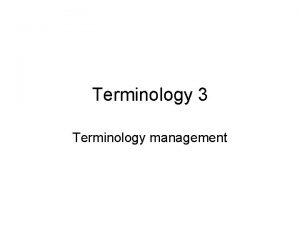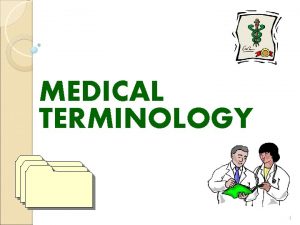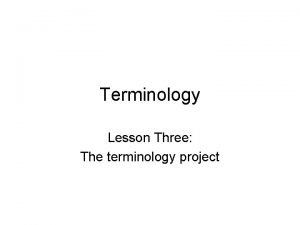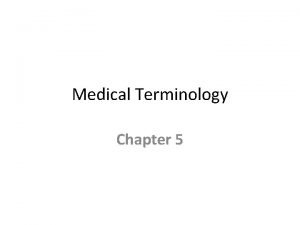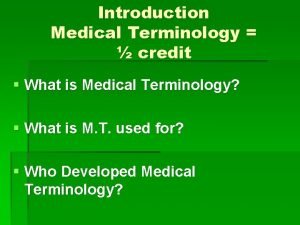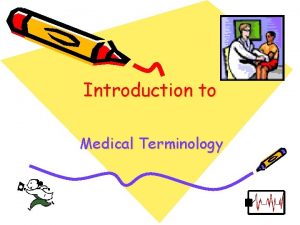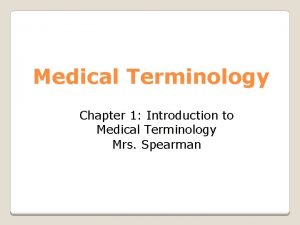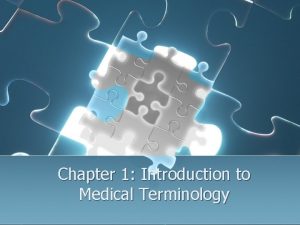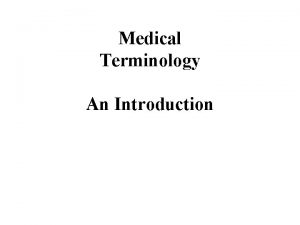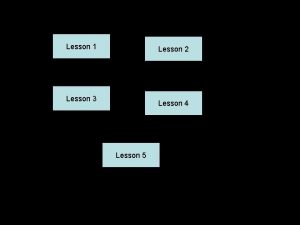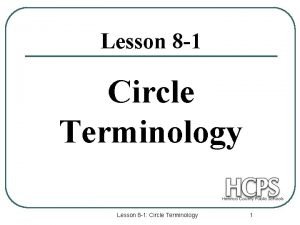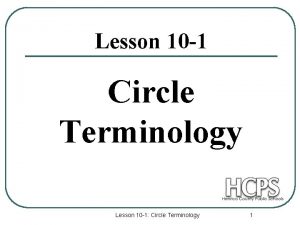Terminology lesson 18 An introduction to the terminology





























- Slides: 29

Terminology lesson 18 An introduction to the terminology of the tertiary sector

Preliminary questions • Can the principles of scientific terminology be applied to the tertiary sector? – Theoretical terminology was developed for technology • need for explicit standardisation • work with engineers • The Machine-tool : model dictionary – Scientific terminology a distant model • nomenclature of chemical substances

Criteria for comparison • Technical terms/scientific terms/ tertiary terms – names / concepts ? – concrete / abstract ? – clear-cut classes / fuzzy classes ?

Example : fault • Classified according to criteria which go to constitute classes – Faults may be defined by the sense/direction of slip • vertical : dip-slip • horizontal : strike slip • oblique : etc…. • These classes or categories are established with an aim in mind – explain the history of the earth –…

Objectivity ? • Completely objective ? – degrees of verticality, horizontality… • Cognitivists claim “objective” fields have fuzzy characters – mineralogy • degrees of hardness • criteria of colours…

A different sort of LSP? • Two fundamentally different sorts of LSPs • LSP with culture-bound terminology – Law – Insurance – Etc. • LSP with non-culture bound terminology – Chemistry – Geology – Physics – The objects of chemistry, geology etc. exist independently of language

Legal ‘language’ : an LSP? • Busse (1999) – An institutional ‘language’ • rather than a ‘Fachsprache’ • Specific to the institution of the law – “Sprache als Institution” – the objects of law and its tools are of a linguistic nature – language is pervasive in the law – importance of performative function – Cf J. L Austin, How to do things with words (1962)

Object of legal ‘language’ • legal discourse is – not to convey specialized knowledge • but to understand law – one must understand its institutions, its rules and therefore its texts – even more important for common law (“local” definitions; cross references, precedents…) than civil law (based on principles, which can be defined).

Law terminology • law terminology is autodefined – definitions are situated on different levels, including for individual circumstances • legal language is studied more by lawyers than by linguists (Cornu 1990) • the aim of legal terminology is not (only) unambiguous communication, precision.

Four features of legal LSP 1. Standardisation in legal language is not aimed at eliminating ambiguity 2. The semantics of legal concepts does not include non ambiguity 3. Legislative concepts are meant to open up spaces of semantic interpretation - though kept in strict limits 4. The demands of legal language and communication are met by establishing a practice of interpretation and usage • they do not explain meaning of texts or concepts in general, but define or limit certain types of cases : institutional standards

Specificities exemplified in questions of translation • Human rights terminology • its fuzzy nature brought out in translation – cf. translating English to Danish • worship : gudstjeneste? • correspondence : brevveksel but does this include tapes, videos, etc… ? ) Marianne Garre (1999)

Typology of equivalence • functional equivalents – cour d’assise : Crown court – intime conviction : being satisfied beyond reasonable doubt • sufficiently close or misleading ? • formal equivalence – conseil constitutionnel : constitutional council – notaire – notary • naturalisations : contraventions, delicts • borrowing – notaire : notaire • descriptive equivalents – contravention, délit, crime : minor offense, major offense, serious crime M. Harvey ttp: //www. tradulex. org/Actes 2000/harvey. pdf

Example of fuzzy concepts • Four definitions of insurance – from a textbook – from an international organisation – from an insurer – from an encylopaedia

Elements of Law and Insurance • Insurance is the means we use to transfer some of the risks, that is, the chances of loss we face each day, from ourselves to professional insurers. Australian first-year textbook

International trade centre • Insurance: A contract whereby the insurer undertakes to reimburse the policyholder in the event of a specified contingency or peril, against the payment of a premium. • http: //www. intracen. org/tfs/docs/glossary/ie. htm (International trade centre)

Lloyds • Insurance : A contract whereby an insurer promises to pay the insured a sum of money or some other benefit upon the happening of one or more uncertain events in exchange for the payment of a premium. There must be uncertainty as to whether the relevant event(s) may happen at all or, if they will occur (eg death) as to their timing. – http: //www. lloyds. com/Help/Glossary. htm

Wikipedia • Insurance is defined as the equitable transfer of the risk of a loss, from one entity to another, in exchange for a premium.

Back to basics! What is the hyperonym of insurance? – a contract (Lloyds, International trade centre) – equitable transfer of risk ? ? (Wikipedia) – means we use to transfer a risk ? ? (textbook)

Some term candidates • insurer, policyholder… (the players) • risk (peril, specified contingency, the happening of one or more uncertain events…) • loss (absent from Lloyds!) • premium… – understand using frames, scripts • the expected way things happen

Polysemy/synonymy Polysemy • Insurance – a contract? - a practice ? Synonymy • Risk, peril, specified contingencies – several words… – for one meaning (? )

A broader context • Insurance, in law and economics, is a form of risk management primarily used to hedge against the risk of a contingent loss. Insurance is defined as the equitable transfer of the risk of a loss, from one entity to another, in exchange for a premium, and can be thought of as a guaranteed and known small loss to prevent a large, possibly devastating loss. An insurer is a company selling the insurance; an insured or policyholder is the person or entity buying the insurance. Wikipedia article

Further features of tertiary terminology • Redefinition of words of the general language – loss – risk – cover relexicalisation reconceptualisation (Philips)

Features shared with scientific LSPs • Relevance of the subfield – cf. …in law and economics… • Use of hyperonyms for hyponyms/ Use of short forms for full forms – loss for – contingent loss

Insurance terminology • Types of insurance – Shifting classes • life /non-life • insurance of the person / insurance of property & pecuniary interest / liability • insurance /reinsurance

marine insurance • cargo – goods being transported • hull – vessel (metonymy) • hull and machinery (H&M) • marine casualty • marine liability • onshore, offshore exposed property

Key terms • average : loss • general average – A loss that arises from the reasonable sacrifice at a time of peril of any part of a ship or its cargo for the purpose of preserving the ship and the remainder of its cargo together with any expenditure made for the same purpose. (Lloyd) • particular average – A partial loss of a ship or cargo which is caused by an insured peril and which is not a general average loss. (Lloyd)

deductible, franchise deductible : the amount payable by the insured in the event of a loss – other property insurance : excess used to discourage moral hazard franchise : deductible below which nothing is payable and beyond which the entire amount of the sum insured is payable.

underwriter • to underwrite – The process of evaluating, defining and pricing insurance and reinsurance risks including where appropriate the rejection of such risks. – The acceptance of the obligation to pay or indemnify the insured or reassured under a contract of insurance or reinsurance. (Lloyds) In marine insurance underwriter = insurer cf. French : souscripteur/souscrire un contrat…

Bibliography • AUSTIN, John (1962) How to do things with words, Oxford, Clarendon. • BUSSE, Dietrich (1999), „Die juristische Fachsprache als Institutionensprache am Beispiel von Gesetzen und ihrer Auslegung“ in HOFFMANN, Lothar, Hartwig KALVERKÄMPER, Herbert Ernst WIEGAND (1998 -9), Fachsprachen/Languages for Special Purposes. Vol 1, 2; 1382 -1391 • CORNU, Gérard (1990), Linguistique juridique, Paris, Montchrestien • GARRE, Marianne (1999), Human Rights in Translation. Legal Concepts in Different Languages, Handelshøjskolen i København • HARVEY, Malcolm « A Beginner’s Course in Legal Translation: the Case of Culture-bound Terms » , in ASSTI/ETI, La traduction juridique : histoire, théorie(s) et pratique, 2000 357 -369. http: //www. tradulex. org/Actes 2000/sommaire. htm • PHILLIPS, Alfred (2002), Lawyers' Language: How and Why Legal Language Is Different, , Routledge. • WÜSTER, Eugen ([1979] 1985) Einführung in die allgemeine Terminologielehre und terminologische Lexikographie, Vienne, Copenhague, Infoterm, Handelshøjskolen i København, 214 p. • ZAWADA, Britta & P Swanepoel (1994), “On the empirical inadequacy of terminological concept theories: A case for prototype theory”, Terminology, 1 / 2 ; 253 -276
 Hát kết hợp bộ gõ cơ thể
Hát kết hợp bộ gõ cơ thể Frameset trong html5
Frameset trong html5 Bổ thể
Bổ thể Tỉ lệ cơ thể trẻ em
Tỉ lệ cơ thể trẻ em Chó sói
Chó sói Chụp tư thế worms-breton
Chụp tư thế worms-breton Alleluia hat len nguoi oi
Alleluia hat len nguoi oi Môn thể thao bắt đầu bằng chữ f
Môn thể thao bắt đầu bằng chữ f Thế nào là hệ số cao nhất
Thế nào là hệ số cao nhất Các châu lục và đại dương trên thế giới
Các châu lục và đại dương trên thế giới Công thức tiính động năng
Công thức tiính động năng Trời xanh đây là của chúng ta thể thơ
Trời xanh đây là của chúng ta thể thơ Cách giải mật thư tọa độ
Cách giải mật thư tọa độ 101012 bằng
101012 bằng độ dài liên kết
độ dài liên kết Các châu lục và đại dương trên thế giới
Các châu lục và đại dương trên thế giới Thể thơ truyền thống
Thể thơ truyền thống Quá trình desamine hóa có thể tạo ra
Quá trình desamine hóa có thể tạo ra Một số thể thơ truyền thống
Một số thể thơ truyền thống Bàn tay mà dây bẩn
Bàn tay mà dây bẩn Vẽ hình chiếu vuông góc của vật thể sau
Vẽ hình chiếu vuông góc của vật thể sau Thế nào là sự mỏi cơ
Thế nào là sự mỏi cơ đặc điểm cơ thể của người tối cổ
đặc điểm cơ thể của người tối cổ Thế nào là giọng cùng tên? *
Thế nào là giọng cùng tên? * Vẽ hình chiếu đứng bằng cạnh của vật thể
Vẽ hình chiếu đứng bằng cạnh của vật thể Vẽ hình chiếu vuông góc của vật thể sau
Vẽ hình chiếu vuông góc của vật thể sau Thẻ vin
Thẻ vin đại từ thay thế
đại từ thay thế điện thế nghỉ
điện thế nghỉ Tư thế ngồi viết
Tư thế ngồi viết






























